National CNS Day 2024
Friday 15 March is National Cancer Nurse Specialists (CNS) Day.
Thank you to all our wonderful cancer nurses for their continued hard work and dedication we are so appreciative of everything you do for our patients and the hospital.
We asked five our of CNS’ why they love their job and what advice they would give to someone looking to become a CNS.
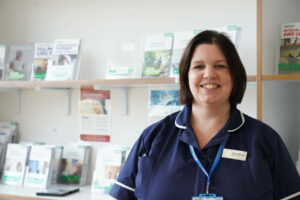
Anna Moore, Palliative and End of life care CNS
I have worked at MKUH since 2006. I became a CNS as it was a natural evolution from my work as a staff nurse at Willen Hospice. I appreciate the balance of autonomy and responsibility within the role. It allows me to maintain a strong clinical focus while also challenging me every day.
The advice I would give is to choose a speciality you love rather than solely as a means for career advancement. That way, your work will have meaning and purpose, and your development will be natural and organic as you strive to be the best you can be.
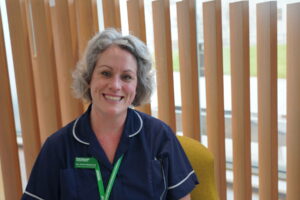
Fay Grech-Marguerat, Macmillan Wellbeing CNS
I have worked at MKUH for 17 years and it is nothing less than a privilege and a pleasure to offer emotional support to people in a really difficult time in their lives when sometimes they can’t talk to other people, like their own family and friends, they can come and talk to us confidentially. That’s partly why I love it but I am also really interested in the nature of Cancer, what it does, how it works and how we can best support people here and now but also in the future.
I would say it is probably one of the best areas of nursing to get involved in just because you meet so many amazing and brave people and you get to walk with them at all different times of their life including difficult times and times of rejoicing. I would say get your basic nursing done for a couple of years and then aim to specialise.
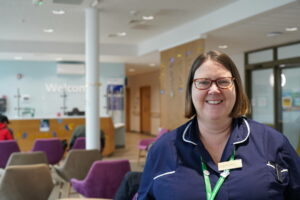
Amanda Naylor, Macmillan Head and Neck Clinical Nurse Specialist
I have worked for MKUH for eight years. I qualified in 2006 and my first job as a registered nurse was on an ENT/Head and Neck Cancer Surgical ward at L & D Hospital. I was thrown in at the deep end looking after tracheostomy and laryngectomy patients and I enjoyed building the nurse patient relationship during their inpatient stays. As part of centralisation of head and neck cancer services in 2009, there was an opportunity to apply for a Band 6 head and neck cancer support nurse to work alongside the clinical nurse specialist. Supporting patients at diagnosis with head and neck cancer, which included ENT and oral cancers, as well as thyroid.
Becoming a CNS was a natural progression into a speciality I loved. Head and Neck cancer patients are extremely complex and require a large multi-disciplinary approach to their care. So you have to be a good team player and communicator to ensure that the patients have a smooth journey through their cancer treatment and beyond.
I find it extremely rewarding and a privilege to be there to support patients and their families at a difficult time in their lives. It can be sad sometimes, but also lovely when patients can be discharged after their 5 years of follow up cancer free. I enjoying teaching others about head and neck cancer and I am quite involved in the tracheostomy education in the trust and with the University of Buckingham Medical Students. I have successfully set up a head and neck support group.
Through my role I have also been involved in reviewing the Macmillan Cancer information booklets for head and neck cancer, Cancer Research online information and I am now part of the National GIRFT team for head and neck cancer. Also, a key member of the BAHNON (British Association of Head and Neck oncology nurses). Again striving to improve services for head and neck cancer patients.
If you want to become a CNS I would suggest working for a few years in a speciality first before moving into a specialist role. The knowledge and skills from looking after a certain cohort of patients definitely stands you in good stead and also working in the areas with regard to treatment of those specific patients, either surgical or oncological. Having that knowledge and experience will help you provide the support needed for those patients.
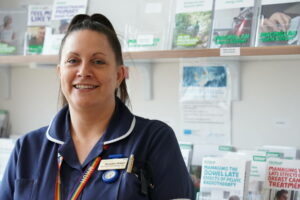
Suzanne Abbott, Haematology CNS
I have worked at MKUH since I qualified as a nurse in 2002. Initially I worked with Haematology patients on the in-patient ward, before moving to the day unit. I worked there until I started this role in 2016. I found the area of Haematology really interesting, and felt that I could provide help and support to patients at a difficult time when life has become more challenging and confusing. I most enjoy getting to know the patients, finding out about what is important to them and their families, and trying to provide support with things that will make a difference to them.
If you want to become a CNS, ensure that it is in an area that you have an overall interest in and find out how the service is run, and what your support will look like. There are many areas that need support of a CNS, and patients benefit when they have the opportunity to build a relationship with their nurse.
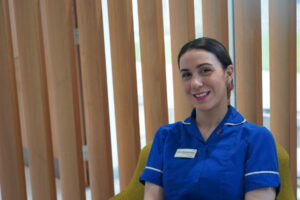
Giulia Madamombe, Breast CNS
I have worked for MKUH for 10 years. My background is in theatre and interventional nursing. However, I had always wanted to be able to provide patients with holistic care, and I could only fulfil this desire by becoming a CNS. I made the big jump just over an year ago and I couldn’t be happier. I love how I can be involved not only by creating and delivering high-quality patient-centred care but also, by putting the patient at the heart of the service, to be able to mould the NHS around patient’s needs.
I love serving as a patient advocate, providing support and guidance to patients and their families while accompanying them on their journey with cancer, from diagnosis to remission or, in the event that the prognosis is not favourable to end of life.
The CNS role is vital to improving NHS cancer service, delivery of care and patient satisfaction, and if you are passionate about being a patient advocate and apply an holistic approach to patient care this is the role for you. As CNS you will be involved in research, collaborate with a multidisciplinary team, work as coach and educator to your patients, help the managing treatment side effect, participate in health awareness and have a leadership role in creating more services for the patients.
Last Modified: 10:31am 21/03/2024
For all media enquiries please contact [email protected]
